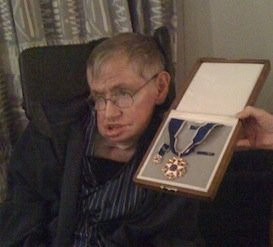I made it back onto the BBC today, this time to discuss Stephen Hawking on his 70th birthday (most of the people more qualified than me are actually at a meeting in his honour in Cambridge). (Actually, my very first appearance on the BBC, which generated one of my very first blog posts, was to talk about Hawking’s bet with Preskill and Thorne about the fate of information supposedly lost into a black hole — Hawking had originally claimed that a black hole destroys any information that fell into it, which would be a violation of the tenets of quantum mechanics, but has since, somewhat controversially, conceded.)
 I have been lucky enough to meet Stephen, and was even invited to a dinner party at his house, where I got to see him posing with his Presidential Medal of Freedom, awarded by Barack Obama in 2009.
I have been lucky enough to meet Stephen, and was even invited to a dinner party at his house, where I got to see him posing with his Presidential Medal of Freedom, awarded by Barack Obama in 2009.
So I was especially disappointed to subsequently hear that he was too ill to actually attend his conference in Cambridge. I wish him a very Happy Birthday and a speedy recovery.
It’s not hard to talk about Hawking: he’s been involved with some truly exciting breakthroughs in theoretical physics over the last few decades, perhaps most importantly for teasing out the relationship between the properties of black holes and the laws of thermodynamics. This seemingly formal analogy was realized to be much more than that with Hawking’s discovery that black holes are not, in fact, “black” — rather, they glow at a temperature inversely proportional to the mass of the black hole, emitting what has come to be called Hawking Radiation.
These are very significant discoveries, teaching us something crucial about the connections between the three great theories of physics, quantum mechanics, gravity and thermodynamics. But it’s safe to say that no one yet fully understands exactly what those relationships are.
And of course Hawking’s nonscientific accomplishments are well-known and justly valorised. He has lived with — triumphed over — ALS for far longer than any of his doctors had predicted. He has written one of the best-selling popular science books of all time, A Brief History of Time. And, needless to say, he’s done some amazing scientific work, just some of which I’ve mentioned above.
There have been very many very brilliant physicists through the centuries. So it would certainly be premature, if not churlish, to take the long view and ask where Hawking would sit in the pantheon of physicists from Archimedes through Newton, Einstein and beyond. Indeed, as my friend and colleague Peter Coles has just written, Hawking’s peers have so far decided that the time is not yet ripe to elevate him to the top of the table. (Peter has also written a short book on the subject, picking apart some of the interactions between scientists, the media and the wider public.)